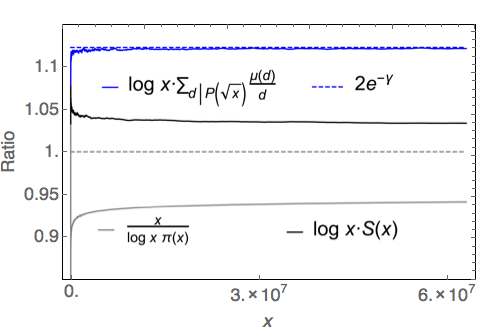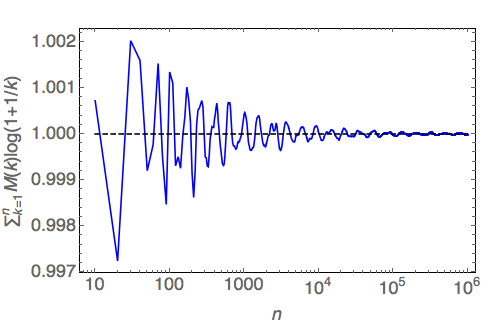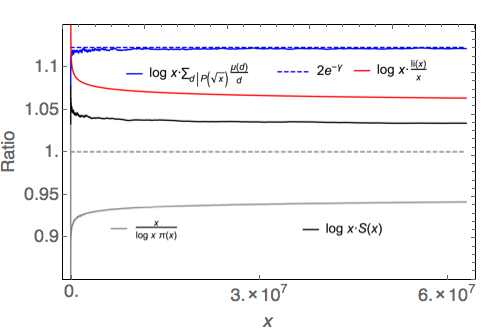Consider the truncated sum
$$ S(x):=\sum_{\substack{{d\mid P(\sqrt{x})}\\{d\leq x}}}\mu(d)/d, $$
where $P(z)$ is the product of all primes less than or equal to $z$, and $\mu(d)$ is the Möbius function.
My question is simply:
Does $S(x)$ have a provable asymptotic limit?
The question is motivated by the following plot:

It is well known from the prime number theorem and Merten's product theorem that $$ \frac{x}{\log x \cdot \pi(x)} \sim 1 \quad \textrm{and} \quad \log x \cdot \sum_{\substack{{d\mid P(\sqrt{x})}}}\mu(d)/d \sim 2 \textrm{e}^{-\gamma}. $$ And in seeing the plot, I got curious of $$ \log x \cdot S(x) \sim ? $$ It is not possible to state from the numerical example what the asymptotic limit of $\log x \cdot S(x)$ will be. But note that so is the case also of $x/(\log x \cdot \pi(x))$, which provable tends to 1. What I'm curious about therefore, is whether $\log x \cdot S(x)$ will go all the way to 1 or stagnate before that.
I did check out chapter 4 of Opera de Cribro by Friedlander and Iwaniec. There it appears that at least in terms of the elementary Legendre sieve, it is not possible to prove the asymptotic limit of $S(x)$. It might be that an affirmative answer lies other places in that book, with more powerful sieving methods. I would be glad if anyone could point me to the right place in that case, as it is a rather chunky piece of literature to just browse through.
ADDED 1: Numerically, it appears that the constant $\sum_{k=1}^{\infty} M(k) \log \Big(1+\frac 1k\Big)$ that was stated below in Lucia's answer should be 1, as according to Terry Tao's comment. This is evidenced in the following plot:

ADDED 2: One could also anticipate the asymptotic limit $$ S(x)\sim \frac{1}{\log x} $$ from the following sloppy heuristic: $S(x)$ can in some sense be seen as the mean value of prime densities below $x$. If we take those densities to be $1/\log x$ around $x$, the average density is simply $\textrm{li}(x)/x$. We know of course that this expression satisfies $$ \frac{\textrm{li}(x)}{x} \sim \frac{1}{\log x}. $$ We might therefore anticipate $S(x)\sim 1/ \log x$. I have added a new version below of the first plot, that also includes the term $\log x \cdot \textrm{li}(x)/x$, revealing that this lies above $\log x \cdot S(x)$. Naturally, we would not expect the two to coincide, as $S(x)$ must interpreted as the mean of a random model where the actual prime distribution is just one specific outcome.

